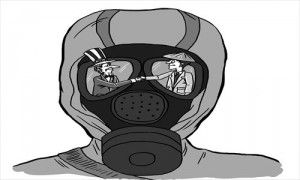
Publisher:
Bonnie King
CONTACT:
Newsroom@Salem-news.com
Advertising:
Adsales@Salem-news.com

~Truth~
~Justice~
~Peace~
TJP
Sep-09-2012 19:05

 TweetFollow @OregonNews
TweetFollow @OregonNews
US Dioxin Cleanup Politically Driven
Wayne Dwernychuk Special to Salem-News.comThe freeing up of US dollars for Da Nang may be less encompassed by altruistic motives, and more by self-serving tendencies...
 |
(DA NANG, Viet Nam) - For over three decades, the US has claimed that no proof exists that the use of Agent Orange by their military during the Vietnam War is the cause of significant health complications in Vietnamese citizens who may have been exposed to the herbicide.
Vietnamese scientists, shortly after the cessation of hostilities between the two countries in 1975, described an increase in human birth defects and other health-related issues in areas sprayed with Agent Orange. The Vietnamese were convinced that Agent Orange was the prime stimulus for observed abnormalities in human birth and immunological disruptions causing deterioration in human health.
The US refused to accept data generated by Vietnamese scientists on the basis that their research did not meet Western standards of rigor. As a consequence, a stalemate has existed for these many years between the two countries, and has been a continuing barrier to completely normalize diplomatic relations between the US and Vietnam.
The Global Times published an article, “Agent Orange cleanup overdue, and not enough for real justice,” on August 27. The article provides a correct overview of the problem of dioxin contamination, and the long-term activities and costs associated with cleanup objectives.
My question, however, is this: If the US maintains and advances the mantra of that there is no proof that Agent Orange or dioxin has caused any human health issues in Vietnam, why then is the US offering financial assistance to Vietnam to support cleanup efforts at Da Nang International Airport, which will undoubtedly lead to additional funding for cleanup at other former US military bases in Vietnam labeled as dioxin hot spots?
I was hopeful, and perhaps naïve, that the US had finally come to the conclusion that Agent Orange or dioxin was detrimental to human health, but did not wish to categorize any assistance to Vietnam as compensation per se, thus avoiding the possibility of admitting guilt, and perhaps leading to legal action.
Although the US assistance may be too little, too late, it does form a framework to move forward bilaterally in addressing dioxin contamination throughout Southern Vietnam. However, there may be a more calculated rationale for the US to finally see their way clear to offer much needed assistance in addressing Vietnam’s contamination problem.
The freeing up of US dollars for Da Nang may be less encompassed by altruistic motives, and more by self-serving tendencies oriented toward the US view of political relationships in the Asia-Pacific region.
China is gradually enhancing its presence in the Asia-Pacific region. The South China Sea region has become a growing concern to both China and Vietnam, given natural resources therein. By offering much needed financial support to Vietnam in its addressing of dioxin contamination, the US, I believe, sees a significant advantage to such actions.
On the one hand, the US receives a positive reaction from the world community, albeit somewhat guarded, for finally offering much needed assistance to Vietnam. And on the other hand, the US receives favorable diplomatic positioning within Vietnam for their long-awaited movement toward righting a wrong caused through the use of Agent Orange during the conflict.
Such positioning will eventually lead to a US military presence in Vietnam, and establish a counter to China’s growing influence in the region.
It is not inconceivable that the US administration has, in fact, moved away, even slightly, from their decades-old mantra of “no proof,” and is now cognizant and accepting of the potential dangers of dioxin contamination.
This position can facilitate cooperative efforts at contaminant reduction and allow significant reduction in the potential for human-dioxin contact, and the resulting negative health consequences. But I suspect seeing the US stance in this light is, perhaps, overly generous.
As to which reason is more significant in this new cooperative approach of dealing with Vietnam’s dioxin problem, is it a US recognition of the dangers of dioxin or US desire to befriend Vietnam as an eventual buffer to China, does it really matter?
For those Vietnamese who have and are suffering as a result of the wartime actions of Agent Orange use by the US military, the geopolitics of the region are of little consequence. The daily lives of many are intermingled with contaminated lands and food. Harm reduction is paramount for them. This alone is worthy of any efforts the US and Vietnam employ to address the lingering legacy of Agent Orange.
The author is an environmental scientist in British Columbia, Canada. opinion@globaltimes.com.cn
Source: Agent Orange Action Group
 |
 |
 |
 |
 |
 |
 |
Articles for September 8, 2012 | Articles for September 9, 2012 | Articles for September 10, 2012

googlec507860f6901db00.html
Salem-News.com:



Terms of Service | Privacy Policy
All comments and messages are approved by people and self promotional links or unacceptable comments are denied.
[Return to Top]
©2025 Salem-News.com. All opinions expressed in this article are those of the author and do not necessarily reflect those of Salem-News.com.